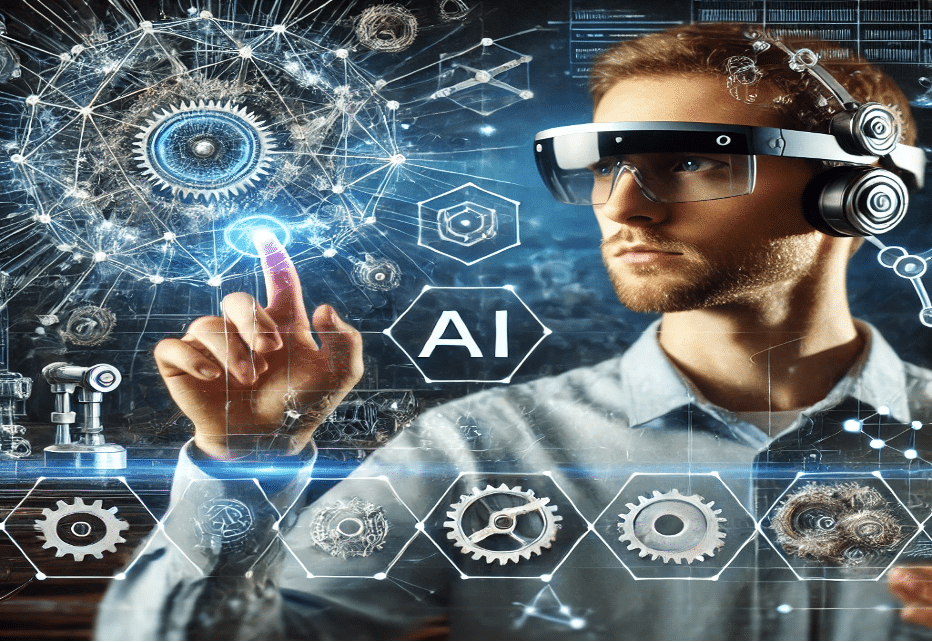
In recent years, the fusion of augmented reality (AR) and artificial intelligence (AI) has been at the forefront of technological advancements, paving the way for a future where human cognition and interaction with the digital world are enhanced. The evolution from AR to augmented knowledge, powered by generative AI, represents not only a shift in technology but also in how we learn, perceive, and make decisions. This article explores the transition from AR to augmented knowledge through generative AI and its implications across industries.
Augmented Reality: A Gateway to Enhanced Experiences
Augmented reality, a technology that overlays digital information onto the physical world, is proving to be a game-changer in gaming, real estate, and retail industries. It enhances perception by creating a blended experience, allowing users to interact with digital elements within a real-world context. This is made possible through various input devices, such as smartphones, headsets, and smart glasses, which superimpose digital visuals and data onto the user’s field of vision.
The primary goal of AR is to enhance human senses, especially vision, by providing additional layers of information that aid in understanding the surroundings. This is especially useful in fields like medical training, where AR can project 3D anatomy models onto real-life patients, or engineering, where AR can visualize machine components in real time.
Augmented Knowledge: Moving Beyond Perception
While AR enhances perception, its utility is still limited to the visual and auditory senses. The next logical step is to enhance knowledge through visual augmentation and elevating cognitive processes, decision-making, and problem-solving capabilities. This is where the concept of augmented knowledge comes into play.
Augmented knowledge refers to systems that leverage AI and other technologies to enhance a person’s knowledge base and cognitive functions. Unlike AR, which focuses on improving our interaction with the physical world, augmented knowledge aims to augment our understanding, learning processes, and decision-making abilities by providing real-time insights, recommendations, and contextual information based on vast amounts of data.
For example, a doctor might use an augmented knowledge system that integrates medical records, research papers, real-time diagnostic tools, and AI-driven insights to make more informed treatment decisions. Rather than simply visualizing a medical condition, the system could provide knowledge based on thousands of similar cases, factoring in various conditions, genetic markers, and environmental data.
The Role of Generative AI: Bridging AR and Augmented Knowledge
Generative AI, a key player in the transition from AR to augmented knowledge, provides the intelligence needed to process, analyze, and interpret the vast amounts of data that power these technologies. While AR enhances our interaction with the physical world, generative AI ensures that this interaction is meaningful, contextually relevant, and continuously evolving.
In AR applications, generative AI is already being used to improve object recognition, motion tracking, and environmental mapping. This enables more accurate and intuitive AR experiences, as the system can understand and adapt to the user’s surroundings in real-time. For instance, in AR-powered design tools, generative AI can recognize physical objects and suggest modifications, improvements, or complementary components based on the user’s actions.
However, the true potential of generative AI emerges when we transition to augmented knowledge. AI’s ability to analyze data from multiple sources, recognize patterns, and offer predictive insights empowers systems to enhance human decision-making in ways previously thought impossible. Machine learning algorithms can sift through enormous datasets, learn from historical trends, and provide actionable insights tailored to specific industries and use cases, giving decision-makers a new level of confidence and control.
In manufacturing, for instance, a generative AI-driven augmented knowledge system could recommend the most efficient production methods, predict equipment failures, and even offer real-time optimizations to reduce waste and increase productivity. Engineers and designers can benefit from real-time suggestions, improving design accuracy and reducing the need for physical prototypes. This efficiency and productivity boost is set to revolutionize the manufacturing industry, giving professionals a reason to be optimistic and motivated about the future.
Applications of Augmented Knowledge in Industry
The transition from AR to augmented knowledge is set to revolutionize many industries. Below are some examples of how this transformation is already taking shape.
Healthcare
Augmented knowledge systems will greatly benefit the medical field. AI-powered tools can analyze a patient’s health data in real-time, comparing it to global medical databases, genetic information, and clinical trials to offer diagnosis and treatment options. Moreover, in medical education, augmented knowledge systems can enable students to practice complex procedures with AI-driven feedback, accelerating learning and improving the precision of future medical professionals.
Manufacturing and Engineering
In manufacturing, generative AI and augmented knowledge systems are transforming the way engineers design, test, and produce products. These systems can analyze existing designs, suggest optimizations, and even generate entirely new product concepts based on desired specifications. By incorporating AI-driven insights, product development cycles can be significantly shortened, allowing companies to bring new innovations to market faster.
Generative AI can automatically generate multiple design options based on input criteria, helping designers explore a broader range of possibilities without the need for constant manual iteration. This can lead to more innovative product designs and reduce the time spent in the initial concept phase.
Generative AI systems can predict potential design flaws early in the process, reducing costly rework and minimizing the risk of failure during production for engineers working on complex machinery or components. These systems can also suggest the most cost-effective materials, manufacturing methods, and assembly processes based on real-time data from the factory floor.
By integrating AI into AR tools, engineers can access real-time data about machinery, identify inefficiencies, and receive step-by-step guidance on repairs or adjustments. Product development teams can also collaborate remotely using AR platforms enhanced by AI, sharing real-time augmented views of machine components or design models. AI can assist by offering optimizations or pointing out potential design flaws based on data from past projects.
Generative AI and augmented knowledge are set to revolutionize product development. By accelerating innovation, reducing costs, and enhancing team collaboration, these technologies are reshaping the way engineers design, test, and produce products.
Education and Training
The education sector is experiencing a paradigm shift due to AI-powered augmented knowledge. Instead of relying on traditional learning methods, students can now engage with interactive, real-time feedback systems. These systems present information visually and provide AI-driven insights. They also adapt learning paths based on student performance and suggest additional resources tailored to individual needs.
For example, an engineering student could use an AR headset to visualize complex mechanical systems. In contrast, an AI-powered augmented knowledge system tracks their progress and offers personalized tutoring based on areas of struggle.
Customer Support and Retail
Retailers are using AI-driven AR to enhance customer experiences. For instance, AR can overlay product information in physical stores, allowing customers to visualize how a piece of furniture would look in their home or get instant recommendations based on their preferences. Combined with generative AI, these systems evolve into augmented knowledge platforms that can offer real-time customer support, suggest related products, and predict future buying trends.
For customer support teams, augmented knowledge systems provide real-time information about customer history, product details, and potential solutions, enabling faster and more accurate responses. AI can also assist by analyzing customer sentiment and offering personalized suggestions to enhance satisfaction.
The Future: From Reactive to Predictive Systems
The shift from augmented reality to augmented knowledge signals a more significant trend in technological evolution — the move from reactive to predictive systems. While AR enhances the user’s current experience, augmented knowledge, and generative AI look ahead, predicting future needs, challenges, and opportunities.
For example, in supply chain management, augmented knowledge systems can predict demand fluctuations, recommend stock levels, and identify potential bottlenecks before they occur. In healthcare, they can anticipate disease outbreaks based on real-time data, suggest preventive measures, and optimize resource allocation.
As we progress toward a future dominated by AI, the line between human cognition and machine intelligence will blur. AI’s ability to process vast amounts of data in real-time and offer insights beyond human capabilities will redefine how we make decisions, learn, and interact with our environment.
Conclusion: A Call to Action
The transition from augmented reality to augmented knowledge through generative AI is not merely a technological evolution but a transformation in how we perceive and interact with the world. Integrating AI with AR enhances not only our physical experience but also our cognitive abilities, enabling smarter decisions and more informed actions.
For businesses, the future lies in adopting these technologies to stay ahead in a competitive market. Convergence Consulting is at the forefront of this transformation, offering integrated solutions that blend AR, AI, and augmented knowledge to accelerate innovation. By embracing these technologies, industries can unlock new efficiency, productivity, and competitiveness levels.
Call to Action: If your business is ready to explore the potential of augmented knowledge and generative AI to drive innovation, Convergence Consulting is here to help. Contact us today to learn how we can transform your processes, enhance decision-making, and position your company at the forefront of technological advancement. Let’s build the future together.

Leave a Reply